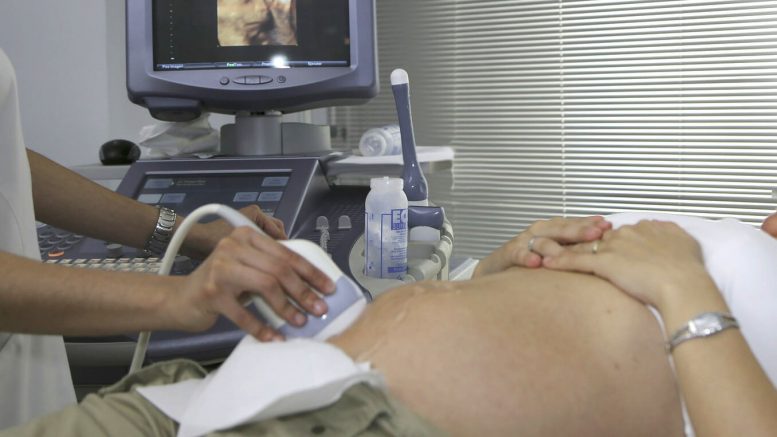Complications during pregnancy can result from common conditions that are exclusively linked to the pregnant state or they can occur incidentally in women during pregnancy. Serious sequelae may include maternal morbidity, congenital disabilities, macrosomia, low birth weight, premature birth, stillbirth, pre-term labor or miscarriage. Complications affecting fetus and mother may arise at any point in pregnancy, during postpartum or during labor.
Ectopic Pregnancy
This condition occurs when the pregnancy grows outside the womb, typically in one of the fallopian tubes. The embryo in ectopic pregnancy will not survive, and it will miscarry.
The results of an ectopic pregnancy can be dire and life-threatening. The common symptoms are low blood pressure and abdominal pain after a missed period or a positive pregnancy test.
Women of child-bearing age experiencing unusual abdominal pains should see a health care provider. Diagnosis requires an ultrasound scan and internal examination. The ectopic pregnancy will need an operation-keyhole surgery to terminate the embryo and in extreme cases the fallopian tubes as well.

This might result in an open surgery in case of complications. An alternative treatment is using Methotrexate, medication for reducing fertilization of cells. It is an addition to operation.
Bleeding, common complication during pregnancy
Vaginal bleeding during pregnancy isn’t healthy and shouldn’t be ignored. Vaginal bleeding might be as a cause of serious complications, so it is essential to find out. If you are experience bleeding contact your midwife or doctor immediately.
Nonetheless, if the placenta is low lying, this may cause bleeding (over the neck of the womb). Your midwife should inform you.
In some instances, bleeding might be due to placenta abruption a condition which the placenta comes away from the womb’s wall. -This will be accompanied by severe pain to both you and the baby.
Gestational Diabetes
Diabetes that comes about in pregnancy is gestational diabetes that affects about 5% of all the pregnant women. It is a result of the pancreas not producing adequate insulin the hormone responsible for regulating sugar levels in the mother’s body.
A pregnant woman requires higher insulin amounts to keep the blood sugar down, and women may temporarily develop diabetes in their second trimester.
Some risk factors include:
- Previous history of gestational diabetes
- History of type2 diabetes (late-onset)
- Aged over 35
- Obesity

During your antenatal care, the blood glucose levels are under control. If diagnosed with gestational diabetes a diabetologist will take charge to ensure your glucose level is correct in the pregnancy.
Uncontrolled glucose can result in fat (macrosomic) babies who might come across challenges in delivery or develop problems after birth, like breathing difficulties or jaundice. Also, you’re at higher risk of stillbirth.
Treatment involves developing a plan with your dietician for regular and gentle exercise. Also, there may be a need for insulin injections to control glucose levels. The obstetrician may induce labor a week before the due date, and cesarean section is more frequent in gestational diabetes. Most women will not need insulin after giving birth, but they’re at higher risk of type2 diabetes later in life.
Pre-eclampsia
During pregnancy urine and blood pressure are monitored at the antenatal clinics. The reason, protein in the urine and rise in blood pressure can be the early signs of pre-eclampsia brought by pregnancy.
It occurs in about 10% pregnancies and can run in families, usually in the third trimester and accompanied by edema (generalized swelling).Most cases cause no trouble and are mild. Severe cases happen in about one in fifty pregnancies and can be critical to both the baby and mother.
It is not entirely clear what causes pre-eclampsia, but some predisposing factors are:
- History of kidney disease
- Previous history of pre-eclampsia
- Multiple pregnancies (twins or triplets)
- Previous hypertension diagnosis
- Diabetes
- A first pregnancy
Pre-eclampsia causes fit (eclampsia) in the mother hence affecting the baby’s development. It can be life-threatening if left untreated, the reason for frequent antenatal checks.
This condition mostly happens in the last trimester but can still occur at any stage of pregnancy and can happen after birth too. It is more damaging if it starts early in pregnancy.
Treatment can start with bed rest at home. However, some expectant mothers need medicine to lower blood pressure. At times it can be the reason for early deliveries either by cesarean section or induction of labor.
Deep vein thrombosis
This is a condition that blood clots form deep in the leg veins. It becomes fatal when the clots move from legs to the lungs. You are vulnerable when on a long haul flight, sitting in still position for a long time. If you develop painful and swollen legs or have breathing difficulties check your medical doctor.
Obstetric Cholestasis and Severe Itching
Serious itching can be a symptom for a condition known as obstetric cholestasis. A more hereditary and potentially dangerous liver disorder, but it can occur with no family history.
It is a symptom is persistent generalized itching without rashes, more so the last four months. When severe can lead to stillbirth, premature birth or serious health complications to the baby; increases the chances of maternal bleeding after childbirth.
See your medical doctor if:
- You get a severe rash and itching
- You develop jaundice
- Itching becomes severe; affecting the feet and hands.
- Baby’s movements change or reduce
An expectant mom becomes aware of their baby’s action at 18-20 weeks. You shouldn’t retire to bed ignoring changes or reduced mobility in the baby’s movement. Don’t rely on home kits to listen to your infant’s heartbeat. Always seek medical advice from a profession to prevent complications during pregnancy.
The care you will depend on the stage of pregnancy and will involve:
- Monitoring your baby’s heart rate for at least 30 minute
- Referral to specialist fetal care
- Ultrasound scan
- Listening to the baby’s heartbeat
Oligohydramnios (low Amniotic Fluid)
The amniotic fluid helps in baby’s development in the womb, being a vital baby’s life-support system. When the level of amniotic fluid is relatively low in the womb is called oligohydramnios. It is common conditions in the last trimester but can still happen at any point in pregnancy.
When it occurs in the first trimester, it can cause miscarriage and congenital disabilities. In the second trimester, complications may include premature birth and difficulties in labor like cord compression. Amniotic levels are closely monitored in during pregnancy, and in case oligohydramnios is detected in the final trimester, inducing labor is an option.
Complications during pregnancy are health challenges that occur during pregnancy. It may involve the infant’s and mom’s health or both. Some women may have health issues before they are pregnant and others develop health problems during pregnancy that could lead to complications. It is necessary for women to receive health care before and in pregnancy to reduce the chances of pregnancy complications.




